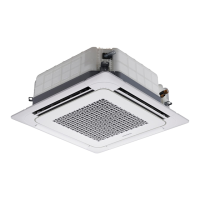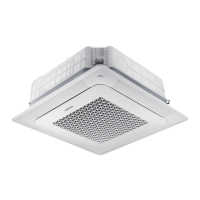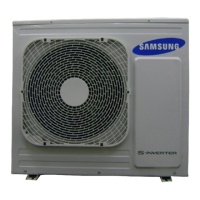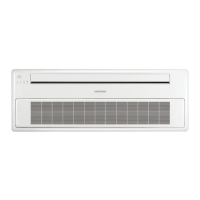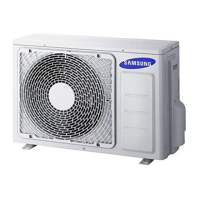Insulation
Once you have checked that there are no leaks in the system, you can insulate the piping and hose.
1. To avoid condensation problems, place an insulator around each refrigerant
pipe.
2. Select the insulation of the refrigerant pipe.
Insulate the gas side and liquid side pipe referring to the thickness according to the pipe size.
Less than Indoor temperature of 30°C and humidity of 85% is the standard condition. If installing in a high humidity
condition, use one grade thicker insulator by referring to the table below. If installing in an unfavorable conditions, use
thicker one.
Insulator’s heat-resistance temperature should be more than 120°C.
When installing insulation in places and conditions below, use the same insulation that is used for high humidity
conditions.
<Geological condition>
- High humidity places such as shoreline, hot spring, near lake or river, and ridge (when the part of the building is
covered by earth and sand.)
<Operation purpose condition>
- Restaurant ceiling, sauna, swimming pool etc.
<Building construction condition>
- The ceiling frequently exposed to moisture and cooling is not covered.
e.g. The pipe installed at a corridor of a dormitory and studio or near an exit that opens and closes frequently.
- The place where the pipe is installed is highly humid due to the lack of ventilation system.
NBR
• When insulate the pipe, be sure to overlap the insulation.
• The insulation has to be produced in full compliance of European regulation
reg. EEC / EU 2037/ 2000 that requires the use of sheaths insulation form
without using CFC and HCFC gases for health and the environment.
• When insulating the pipe, use non-slit insulator.
Pipe Pipe size
Insulation Type (Heating/Cooling)
RemarksStandard [Less than 30°C, 85%] High humidity [over 30°C, 85%]
EPDM, NBR
Liquid pipe
Ø6.35~Ø9.52 9t 9t
Internal temperature is
higher than 120°C
Ø12.7~Ø19.05 13t 13t
Gas pipe
Ø6.35 13t 19t
Ø9.52~Ø19.05 19t 25t

